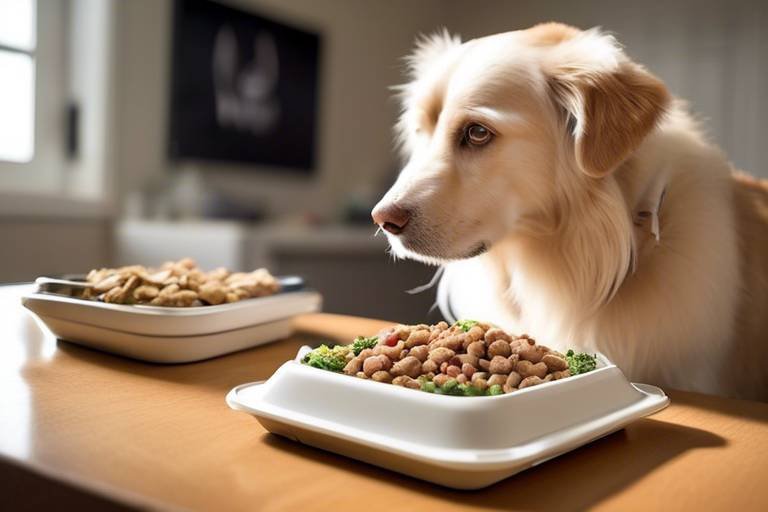The Importance of Tailoring Diets for Different Breeds
When it comes to our furry friends, one size definitely does not fit all, especially regarding their diets. Just like humans, dogs have unique dietary needs that vary by breed, size, and activity level. Imagine feeding a Great Dane the same way you would a Chihuahua; it just wouldn't work! This article dives into the fascinating world of breed-specific nutrition and why customizing diets is crucial for ensuring our dogs lead healthy and happy lives.
Understanding the specific needs of different breeds is vital. Each breed has its own metabolic rate, which influences how they process food and utilize nutrients. For instance, a high-energy breed like a Border Collie will require a different caloric intake compared to a more laid-back breed like a Bulldog. By tailoring their diets, we can help our dogs maintain an ideal weight, support their energy levels, and promote overall health. After all, a well-nourished dog is a happy dog!
So, what does it mean to tailor a diet for a specific breed? It involves considering various factors, including age, size, and lifestyle. For example, puppies need different nutrients than adult dogs, and active breeds may require higher protein levels to sustain their energy. By paying attention to these details, we can create a balanced diet that caters to each dog's unique needs, much like how a tailor fits a suit to an individual's body shape.
In the following sections, we will explore the essential nutrients that different breeds require, common dietary issues they face, and how consulting with veterinarians and nutritionists can help us provide the best diets for our beloved pets. Whether you're a seasoned dog owner or a new pet parent, understanding the importance of breed-specific nutrition is key to unlocking the full potential of your dog's health and happiness.
Different breeds have varying metabolic rates and dietary requirements. Understanding these needs is crucial for providing a balanced diet that supports their health and longevity.
Each breed may require specific nutrients such as proteins, fats, and carbohydrates. Knowing the right balance can help maintain energy levels and overall health.
Protein is essential for muscle development and repair. Different breeds have different protein needs based on their size, age, and activity level.
Large breeds often need more protein to support their muscle mass, while small breeds may require higher protein concentration in smaller portions.
Active breeds, such as working dogs, typically need diets higher in protein to sustain their energy levels and support recovery.
Fats provide essential fatty acids and energy, while carbohydrates serve as a vital energy source. Each breed's requirements can vary significantly.
Certain breeds are predisposed to specific dietary issues, such as obesity or allergies. Identifying these can help in formulating better diets.
Some breeds are more prone to obesity due to their metabolism and lifestyle. Tailoring diets can help manage their weight effectively.
Certain breeds may experience food allergies or sensitivities. Understanding these can assist in selecting appropriate ingredients for their diets.
Professional guidance is essential for tailoring diets. Veterinarians and pet nutritionists can provide valuable insights into breed-specific dietary needs.
Regular veterinary check-ups can help monitor a dog's health and dietary needs, ensuring they receive the best nutrition.
Pet nutritionists can create tailored diet plans based on a dog's breed, age, and health condition, optimizing their overall well-being.
- Why is it important to tailor my dog's diet? Tailoring your dog's diet ensures they receive the right nutrients for their specific breed, size, and activity level, promoting optimal health.
- What are common dietary issues in dogs? Common issues include obesity, food allergies, and sensitivities that can vary by breed.
- How can I determine the right diet for my dog? Consult with a veterinarian or a pet nutritionist who can provide tailored advice based on your dog's needs.

Understanding Breed-Specific Nutritional Needs
When it comes to our furry friends, one size definitely does not fit all, especially regarding their diets. Just like humans, dogs have unique nutritional requirements that can vary dramatically from one breed to another. This is primarily due to differences in metabolic rates, body sizes, and activity levels. For instance, a **Great Dane** and a **Chihuahua** have vastly different energy needs and digestive capabilities, which means the same food could be detrimental to one while being perfectly fine for the other.
Let’s take a moment to explore why understanding these breed-specific needs is crucial. Imagine trying to fuel a sports car with regular gasoline—it just wouldn’t work! Similarly, feeding your dog the wrong diet can lead to a host of health issues. A well-balanced diet tailored to a dog's breed can enhance their energy levels, promote a shiny coat, and even improve their overall mood. This understanding starts with recognizing that not all dogs are created equal.
To break it down further, here are some key factors that influence a dog's nutritional needs:
- Size: Larger breeds often require more calories and specific nutrients to maintain their muscle mass and bone health, while smaller breeds may need concentrated nutrients in smaller portions.
- Age: Puppies, adults, and senior dogs all have different dietary needs. For instance, puppies need a diet rich in protein and fat for growth, whereas senior dogs might require fewer calories and more fiber.
- Activity Level: Active breeds, like Border Collies, burn more energy and need diets that support their high energy levels, while less active breeds may benefit from lower-calorie diets to prevent obesity.
Moreover, certain breeds are predisposed to specific health issues that can be influenced by diet. For example, some breeds are more prone to allergies or sensitivities, necessitating a diet free from certain ingredients. Understanding these factors not only helps in selecting the right food but also in preventing potential health problems down the line.
In conclusion, tailoring a dog's diet based on their breed is not just a trend; it's a necessity for their health and happiness. By considering their unique nutritional needs, we can ensure that our loyal companions live long, healthy lives filled with joy and vitality. So, the next time you’re at the pet store, remember that your dog's breed should guide your choices, just like a chef selects ingredients based on a recipe!

Key Nutrients for Different Breeds
When it comes to keeping our furry friends happy and healthy, understanding their unique dietary requirements is absolutely essential. Just like how we all have different tastes and nutritional needs, dog breeds vary significantly in what they need to thrive. This is where the concept of key nutrients comes into play. Each breed may require specific nutrients such as proteins, fats, and carbohydrates, and getting the right balance is crucial for maintaining their energy levels and overall health.
Let’s dive a little deeper into the essential nutrients that play a vital role in your dog’s diet. First up is protein. This nutrient is the building block of life, essential for muscle development and repair. Think of protein as the foundation of a house; without a strong foundation, everything else can crumble. Different breeds have different protein needs based on their size, age, and activity level. For instance, a Great Dane will require more protein to support its larger muscle mass than a Chihuahua, which is smaller and requires less protein overall but may need a higher concentration of it in their food due to their faster metabolism.
Next, we have fats. These are not just the villains they are often made out to be; in fact, fats provide essential fatty acids and energy, acting as a concentrated source of calories. Fats are crucial for maintaining a shiny coat and healthy skin. However, the amount of fat needed can vary. For example, active breeds like Border Collies or German Shepherds may require higher fat levels to sustain their energy during rigorous activities, whereas less active breeds might need a more moderate fat content to avoid unnecessary weight gain.
Another important nutrient is carbohydrates. These serve as a vital energy source and are often found in grains, vegetables, and fruits. While some may argue that dogs are primarily carnivores, carbohydrates can provide essential fiber and energy, especially for breeds that require it. For instance, working dogs benefit from a diet rich in carbohydrates to fuel their long hours of activity. However, it’s essential to ensure that the carbohydrates come from high-quality sources, as low-quality fillers can lead to digestive issues.
To summarize, here’s a quick look at the key nutrients and their importance:
| Nutrient | Importance | Considerations by Breed |
|---|---|---|
| Protein | Muscle development and repair | Higher needs for large and active breeds |
| Fats | Energy source and coat health | More for active breeds; moderation for less active |
| Carbohydrates | Energy and fiber | Essential for working dogs; quality matters |
Understanding these key nutrients and their specific requirements based on breed can help you make informed decisions about your dog's diet. Remember, just as we wouldn’t feed a toddler the same diet as a teenager, we shouldn’t treat all dogs the same when it comes to their food. Tailoring their diet to meet their unique needs is the best way to ensure they live a long, healthy, and happy life.
Protein Requirements
When it comes to our furry friends, protein is the building block of life. Just like humans need a balanced intake of nutrients to thrive, dogs require specific amounts of protein to support their growth, energy, and overall health. But here's the kicker: not all breeds are created equal! Different breeds have varying protein needs based on factors like size, age, and activity level. For instance, a sprightly Border Collie will have different protein requirements compared to a laid-back Bulldog. So, how do we ensure that our pups are getting the right amount?
First off, let's talk about muscle development and repair. Protein plays a crucial role in building and maintaining muscle mass. Larger breeds, such as Great Danes or Rottweilers, often need a higher protein intake to support their substantial muscle mass. In contrast, smaller breeds, like Chihuahuas or Pomeranians, may need a higher concentration of protein in smaller portions to meet their needs without overloading their systems. It's like comparing a heavyweight boxer to a featherweight; both need fuel, but the type and amount vary significantly.
Active breeds, particularly working dogs such as German Shepherds and Labrador Retrievers, are another story altogether. These dogs require diets that are higher in protein to sustain their energy levels and support recovery after strenuous activities. Think of it as a high-performance sports car; it needs premium fuel to run at its best! Therefore, if your dog is constantly on the go, engaging in activities like agility training or herding, you might want to consider a protein-rich diet designed specifically for their lifestyle.
To give you a clearer picture of how protein needs can vary, here's a quick
| Breed Size | Protein Requirement (grams per kg of body weight) |
|---|---|
| Small Breeds (up to 10 kg) | 20-30 g |
| Medium Breeds (10-25 kg) | 15-25 g |
| Large Breeds (25-50 kg) | 10-20 g |
| Giant Breeds (over 50 kg) | 8-15 g |
In summary, understanding your dog's protein requirements is essential for their health and well-being. Whether you have a tiny terrier or a massive mastiff, paying attention to their protein intake can make all the difference in their energy levels, muscle development, and overall quality of life. So, the next time you're at the pet store, take a moment to consider your dog's unique needs. After all, they deserve the best!
Q: How can I tell if my dog is getting enough protein?
A: Look for signs of good health such as shiny fur, healthy weight, and high energy levels. If you're unsure, consult your veterinarian for tailored advice.
Q: Are there any risks associated with high protein diets?
A: Yes, too much protein can lead to kidney strain in some dogs, especially those with pre-existing conditions. Always consult a vet before making significant dietary changes.
Q: Can I feed my dog human food for protein?
A: Some human foods are safe and nutritious for dogs, like cooked chicken or fish. However, always check for toxic foods and consult a vet for guidance.
Large Breeds vs. Small Breeds
When it comes to feeding our furry friends, size truly matters! Large breeds and small breeds have distinct dietary requirements that reflect their unique biology and lifestyle. For instance, larger dogs, like Great Danes and Mastiffs, typically require a higher quantity of protein to sustain their muscle mass and support their overall health. This is because their larger bodies demand more nutrients to function optimally. Think of it like fueling a big truck versus a compact car; the truck simply needs more fuel to keep moving!
On the flip side, small breeds, such as Chihuahuas and Pomeranians, have a different set of needs. They may not require as much protein in total, but the concentration of protein in their food is crucial. Their small stomachs can't handle large portions, so they need nutrient-dense meals that pack a punch in every bite. It's like giving a tiny espresso shot instead of a full cup of coffee; the smaller serving needs to be more potent to have the same effect.
Moreover, the differences in metabolism between large and small breeds can affect how they process nutrients. Large breeds might be more prone to certain health issues, such as hip dysplasia, which can be exacerbated by obesity. Therefore, their diets should be carefully monitored to ensure they maintain a healthy weight. In contrast, small breeds can be more susceptible to dental issues, so their diets should also promote oral health. This could mean incorporating specific kibble shapes that help clean their teeth as they chew.
| Breed Size | Protein Requirement | Common Health Issues |
|---|---|---|
| Large Breeds | Higher quantity needed for muscle support | Hip dysplasia, obesity |
| Small Breeds | Higher concentration in smaller portions | Dental issues, obesity |
In summary, understanding the differences between large and small breeds is vital for providing tailored diets that cater to their specific needs. By doing so, we not only promote their health but also enhance their quality of life. So next time you’re shopping for dog food, remember: one size does not fit all!
- What is the best diet for large breeds? Large breeds typically benefit from a diet rich in protein and low in fat to support their muscle mass and joint health.
- How often should I feed my small dog? Small dogs often require multiple small meals throughout the day to maintain their energy levels.
- Are there specific brands recommended for different breeds? Yes, many pet food brands offer breed-specific formulas designed to meet the unique needs of various dog sizes.
Active Breeds
When it comes to , we're talking about those furry bundles of energy that are always ready for an adventure. Think of breeds like Border Collies, Australian Shepherds, and Siberian Huskies—these dogs thrive on physical activity and mental stimulation. Their high energy levels demand a diet that not only fuels their bodies but also supports their recovery after intense exercise. Imagine trying to run a marathon on an empty stomach; that’s how these dogs feel without the right nutrition!
Active breeds typically require a diet that is higher in protein compared to their less active counterparts. This is because protein plays a crucial role in muscle repair and growth, which is essential for dogs that are constantly on the move. For instance, a Border Collie might need up to 30% protein in their diet to maintain their muscle mass and energy levels. The right balance of nutrients can make a world of difference in their performance and overall health.
Moreover, it's not just about the quantity of protein; the quality matters too. High-quality protein sources, such as chicken, beef, or fish, are vital for these active dogs. Additionally, incorporating healthy fats into their diet is equally important. Fats provide essential fatty acids that help with energy production and support joint health, which is crucial for dogs that engage in high-impact activities. A well-rounded diet for these breeds may look something like this:
| Nutrient | Recommended Percentage | Sources |
|---|---|---|
| Protein | 25-30% | Chicken, Beef, Fish |
| Fats | 15-20% | Fish Oil, Chicken Fat |
| Carbohydrates | 30-50% | Brown Rice, Sweet Potatoes |
In addition to protein and fats, carbohydrates also play a significant role in sustaining energy levels. Active breeds often benefit from complex carbohydrates, which provide a steady release of energy. Think of them as a slow-burning fuel that keeps their engines running during those long walks or play sessions at the park. Foods like brown rice and sweet potatoes can serve as excellent sources of these vital carbs.
However, it’s essential to remember that every dog is unique. Factors such as age, weight, and specific health conditions can influence their dietary needs. Therefore, it’s always a smart move to consult with a veterinarian or a pet nutritionist to create a tailored diet plan that suits your active pup's lifestyle.
In summary, providing the right nutrition for active breeds is not just about filling their bowls; it’s about ensuring they have the energy and nutrients they need to thrive. With the right balance of protein, fats, and carbohydrates, you can help your energetic friend stay healthy, happy, and ready for their next adventure!
- What are the signs that my dog is not getting enough nutrition?
Look for signs like lethargy, poor coat condition, and weight loss. If you notice any of these, it may be time to reassess their diet.
- Can I feed my active dog a regular dog food?
While some regular dog foods may suffice, active breeds often require specialized diets with higher protein and fat content to meet their energy needs.
- How often should I feed my active dog?
Active dogs may benefit from multiple meals throughout the day to maintain energy levels, rather than just one or two large meals.
Fat and Carbohydrate Considerations
When it comes to crafting the perfect diet for your furry friend, fats and carbohydrates play pivotal roles that shouldn't be overlooked. Fats are not just a source of energy; they are essential for maintaining healthy skin and a shiny coat. They also provide crucial fatty acids that support brain function and cell structure. However, the amount and type of fat needed can vary significantly between breeds. For instance, larger breeds might require a different balance of fats compared to smaller breeds, primarily due to their varying metabolism rates and energy needs.
On the other hand, carbohydrates serve as a primary energy source, fueling your dog's daily activities. While some people might think that dogs can thrive on a low-carb diet, it's important to remember that carbohydrates can provide necessary dietary fiber, which aids in digestion and keeps your pup feeling full. However, not all carbohydrates are created equal. Whole grains, fruits, and vegetables can be beneficial, while fillers and low-quality grains can lead to health issues.
To illustrate the importance of balancing fats and carbohydrates in your dog's diet, consider the following table:
| Breed Type | Optimal Fat Content (%) | Recommended Carbohydrate Sources |
|---|---|---|
| Large Breeds | 8-15% | Brown rice, sweet potatoes |
| Small Breeds | 10-20% | Oats, peas |
| Active Breeds | 15-25% | Barley, quinoa |
As you can see, the dietary needs vary not just by breed size but also by activity level. Active breeds, like working dogs, require higher fat content to sustain their energy levels throughout the day. This is akin to how athletes need more fuel than someone who leads a sedentary lifestyle. It's all about meeting the specific energy demands of your dog!
In conclusion, understanding the role of fats and carbohydrates in your dog's diet is essential for their health and vitality. A well-balanced diet that considers these factors can lead to a happier, healthier dog. Always consult with your veterinarian or a pet nutritionist to tailor the best diet plan that suits your dog's unique needs.
- What are the best sources of fat for dogs? - Healthy fats can be found in fish oil, chicken fat, and flaxseed oil.
- Can dogs be allergic to carbohydrates? - Yes, some dogs can have sensitivities or allergies to certain grains or carbohydrate sources.
- How can I tell if my dog is getting enough fat in their diet? - Look for signs such as a dull coat, dry skin, or low energy levels.

Common Dietary Issues by Breed
When it comes to our furry companions, understanding their unique dietary needs is not just a matter of preference—it’s essential for their health and happiness. Just like humans, dogs can have specific dietary issues that vary significantly from breed to breed. For example, some breeds are more prone to obesity, while others may have sensitivities to certain food ingredients. This is why it’s crucial to tailor diets based on these common dietary issues.
Let’s dive deeper into some of the most prevalent dietary concerns associated with specific breeds. Take the Bulldog, for instance. This lovable breed is notorious for its tendency to gain weight. Their stocky build and relatively low activity levels can lead to obesity if their diets aren’t carefully managed. By providing them with a balanced diet that is lower in calories but still rich in nutrients, owners can help maintain a healthy weight.
In contrast, the Yorkshire Terrier is another breed that faces its own set of dietary challenges. These little bundles of joy often suffer from food allergies and sensitivities. Common allergens include grains and certain proteins, which can lead to skin irritations and digestive issues. It’s crucial for owners to be vigilant and choose high-quality, grain-free dog food that caters to their specific needs.
Moreover, let’s not forget about the Golden Retriever, a breed that is equally beloved and prone to dietary issues. Golden Retrievers are known for their love of food, which can lead to overeating and subsequent obesity. To combat this, it’s important to monitor their portion sizes and provide them with a diet that is rich in omega fatty acids to support their skin and coat health. A well-balanced diet can also help prevent joint issues that are common in this breed as they age.
To summarize, here’s a quick look at some common dietary issues by breed:
| Breed | Common Dietary Issues | Recommended Dietary Adjustments |
|---|---|---|
| Bulldog | Obesity | Lower calorie diet; increase exercise |
| Yorkshire Terrier | Food allergies | Grain-free, high-quality protein |
| Golden Retriever | Obesity, joint issues | Monitor portions; omega fatty acids |
By understanding these breed-specific dietary issues, you can take proactive steps to ensure your dog remains healthy and happy. It’s not just about feeding them; it’s about feeding them right. Tailoring their diets to address these common problems can lead to a longer, healthier life for your beloved pet.
Q: How do I know if my dog is overweight?
A: You can determine if your dog is overweight by checking their body condition score (BCS). You should be able to feel their ribs without excess fat covering. If you can’t, it’s time to consult your vet.
Q: What are the signs of food allergies in dogs?
A: Common signs include itching, skin infections, ear infections, and gastrointestinal issues. If you suspect your dog has food allergies, consult your veterinarian for testing and dietary recommendations.
Q: How often should I feed my dog?
A: This depends on your dog’s age, size, and activity level. Generally, puppies need to be fed more frequently than adult dogs. Consult your vet for a personalized feeding schedule.
Q: Can I switch my dog’s diet suddenly?
A: It’s best to transition your dog to a new diet gradually over a week or so to avoid digestive upset. Mix increasing amounts of the new food with the old food until they are fully transitioned.
Obesity in Specific Breeds
Obesity is a growing concern among dog owners, and it’s particularly prevalent in certain breeds. Just like humans, dogs can struggle with their weight, and this can lead to a myriad of health issues. For instance, breeds such as Beagles, Cocker Spaniels, and Bulldogs are notoriously prone to gaining weight. This is often due to a combination of genetics, metabolism, and lifestyle choices. But what does this mean for you as a pet owner? It means you need to be vigilant and proactive in managing your dog’s diet.
Understanding the reasons behind obesity in these breeds is crucial. Many of these dogs have a slower metabolism, which means they burn calories at a slower rate. This can be compounded by their love for food and treats, which makes it easy to overfeed them. Additionally, some breeds have a natural tendency to be less active, which can further contribute to weight gain. It’s like having a couch potato in your home, but instead of binge-watching shows, they’re just lounging around waiting for their next meal!
To effectively combat obesity, it’s essential to tailor your dog’s diet. Here are a few strategies you can employ:
- Portion Control: Measure their food to avoid overfeeding. It’s easy to underestimate how much is too much, especially with those adorable puppy eyes staring up at you!
- Healthy Treats: Opt for low-calorie treats or even fruits and vegetables that are safe for dogs, like carrots or apple slices.
- Regular Exercise: Incorporate daily walks and playtime to keep your dog active. Think of it as both a workout for them and a great way for you to bond.
Moreover, it’s essential to monitor your dog’s weight regularly. A simple scale can help you keep track of their progress. If you notice any sudden weight gain or loss, it’s wise to consult your veterinarian. They can provide tailored advice and may recommend a specific diet plan that caters to your dog’s unique needs.
In summary, while certain breeds are more susceptible to obesity, it’s not a fate they must accept. With careful attention to their diet and lifestyle, you can help your furry friend maintain a healthy weight and enjoy a longer, happier life. Remember, a healthy dog is a happy dog!
Q: How can I tell if my dog is overweight?
A: You can check by feeling their ribs; you should be able to feel them without too much pressure. Additionally, if your dog has a noticeable belly or a lack of a defined waist, they may be overweight.
Q: Are there specific foods I should avoid for my breed?
A: Yes, certain breeds may have sensitivities to specific ingredients. Consult with your veterinarian to identify any potential allergens and choose a diet that suits your dog’s needs.
Q: How often should I feed my dog?
A: The frequency can vary by age and breed, but generally, adult dogs should be fed twice a day. Puppies may require more frequent meals.
Allergies and Sensitivities
When it comes to our furry friends, allergies and sensitivities can be a real challenge for many dog owners. Just like humans, dogs can suffer from food allergies that can lead to discomfort and health issues. Some breeds are inherently more prone to these conditions, making it vital for pet parents to be vigilant about their dog's diet. For instance, breeds like Boxers, Bulldogs, and Labrador Retrievers often experience skin issues or gastrointestinal upset due to food sensitivities.
Identifying a food allergy can sometimes feel like searching for a needle in a haystack. Symptoms can range from itchy skin and ear infections to more severe reactions like vomiting or diarrhea. If you notice your dog exhibiting any of these signs, it’s crucial to consult with a veterinarian. They might recommend an elimination diet to pinpoint the exact trigger. This involves removing potential allergens from your dog's diet and slowly reintroducing them one at a time.
Common allergens for dogs include:
- Beef
- Dairy
- Wheat
- Chicken
- Eggs
Understanding these sensitivities is essential for creating a balanced diet. For example, if your dog is allergic to chicken, it’s important to choose proteins that are less likely to cause a reaction, such as lamb or fish. Additionally, some dogs may have sensitivities to certain grains, which can lead to digestive issues. In such cases, opting for a grain-free diet might be beneficial.
Moreover, many commercial dog foods are formulated with common allergens in mind, offering hypoallergenic options specifically designed for sensitive dogs. These special formulas often use alternative protein sources and are free from common allergens, providing a safe and nutritious option for dogs with dietary sensitivities.
Ultimately, the key to managing allergies and sensitivities lies in closely monitoring your dog's health and dietary response. Regular veterinary visits and open communication with your vet can help ensure your dog remains healthy and happy, free from the discomfort that allergies can bring.
- What are the common signs of food allergies in dogs?
Common signs include itching, red or inflamed skin, ear infections, and gastrointestinal issues like vomiting or diarrhea. - How can I determine if my dog has a food allergy?
The best method is to conduct an elimination diet under veterinary supervision, gradually reintroducing foods to identify triggers. - Are there specific breeds more prone to food allergies?
Yes, breeds such as Boxers, Bulldogs, and Labrador Retrievers often experience food allergies and sensitivities. - Can I make homemade dog food to avoid allergens?
Yes, homemade diets can be beneficial, but it’s important to consult with a veterinarian or pet nutritionist to ensure the diet is balanced and meets your dog’s nutritional needs.

Consulting with Veterinarians and Nutritionists
When it comes to ensuring that our furry friends receive the best possible nutrition, consulting with veterinarians and pet nutritionists is absolutely essential. Just like how we wouldn't rely solely on Google for our health advice, we shouldn't depend on generic guidelines for our pets. Each dog is unique, and their dietary needs can vary significantly based on factors such as breed, age, activity level, and any underlying health conditions. By working with professionals, we can tailor a diet that not only meets their nutritional requirements but also enhances their quality of life.
Veterinarians are invaluable resources when it comes to understanding your dog's health. They can conduct thorough examinations and recommend appropriate dietary changes based on their findings. For instance, if your dog is overweight, the vet can suggest a weight management plan that includes calorie-controlled meals and exercise routines. On the other hand, if your dog has specific health issues, such as kidney disease or diabetes, the vet can recommend diets that are low in certain nutrients and high in others to help manage these conditions.
Pet nutritionists, on the other hand, specialize in the dietary aspects of pet care. They can create customized diet plans that consider your dog's unique needs. This is particularly important for breeds that are prone to certain health issues. For example, some breeds may require diets that are higher in specific nutrients to prevent common ailments, while others might need hypoallergenic food to avoid allergic reactions. By collaborating with a nutritionist, you can ensure that your dog’s diet is not just balanced, but also tailored to their individual health profile.
To make the most of your consultations, here are a few tips:
- Be Prepared: Bring a list of any health issues your dog has, as well as details about their current diet and feeding habits.
- Ask Questions: Don’t hesitate to ask about specific ingredients, feeding schedules, and portion sizes. Knowledge is power!
- Follow Up: After implementing any dietary changes, schedule follow-up appointments to monitor your dog's progress and make adjustments as needed.
Regular check-ups with your veterinarian are also crucial. These visits allow for ongoing assessments of your dog's health, ensuring that their dietary needs are continually met as they grow and age. Just like humans, dogs undergo various life stages, and their nutritional requirements can change accordingly. For example, a puppy has different needs than a senior dog. By staying in touch with your vet and nutritionist, you can adapt your dog's diet to keep them healthy and happy throughout their life.
In conclusion, the importance of consulting with veterinarians and nutritionists cannot be overstated. They provide the expertise and personalized care that can make a significant difference in your dog’s health and well-being. So, the next time you’re wondering if your dog is getting the right nutrition, remember that professional guidance is just a phone call away!
- How often should I consult with my veterinarian about my dog's diet? It’s recommended to schedule a check-up at least once a year, or more frequently if your dog has specific health concerns.
- Can I create a homemade diet for my dog? While homemade diets can be beneficial, it’s crucial to consult with a pet nutritionist to ensure that all nutritional needs are met.
- What should I do if my dog has food allergies? Consult with your veterinarian to identify the allergens and work with a nutritionist to find suitable food alternatives.
Importance of Regular Check-ups
This article explores how different dog breeds have unique dietary needs and the importance of customizing their diets to ensure optimal health and well-being.
Different breeds have varying metabolic rates and dietary requirements. Understanding these needs is crucial for providing a balanced diet that supports their health and longevity.
Each breed may require specific nutrients such as proteins, fats, and carbohydrates. Knowing the right balance can help maintain energy levels and overall health.
Protein is essential for muscle development and repair. Different breeds have different protein needs based on their size, age, and activity level.
Large breeds often need more protein to support their muscle mass, while small breeds may require higher protein concentration in smaller portions.
Active breeds, such as working dogs, typically need diets higher in protein to sustain their energy levels and support recovery.
Fats provide essential fatty acids and energy, while carbohydrates serve as a vital energy source. Each breed's requirements can vary significantly.
Certain breeds are predisposed to specific dietary issues, such as obesity or allergies. Identifying these can help in formulating better diets.
Some breeds are more prone to obesity due to their metabolism and lifestyle. Tailoring diets can help manage their weight effectively.
Certain breeds may experience food allergies or sensitivities. Understanding these can assist in selecting appropriate ingredients for their diets.
Professional guidance is essential for tailoring diets. Veterinarians and pet nutritionists can provide valuable insights into breed-specific dietary needs.
When it comes to your furry friend, regular veterinary check-ups are absolutely crucial. Just like humans, dogs can develop health issues that often go unnoticed until they become serious. During these check-ups, vets can assess your dog's weight, dental health, and overall condition, which are all essential for maintaining a balanced diet tailored to their specific needs. For instance, if a dog is gaining weight, a vet can recommend dietary adjustments to prevent obesity, which is a common issue in many breeds.
Moreover, regular visits allow for early detection of potential health problems. Conditions like diabetes, kidney disease, or allergies can be managed more effectively when identified early. This proactive approach not only saves money in the long run but also ensures your pet remains healthy and happy. Did you know that some breeds are more prone to certain health issues? For example, large breeds might face joint problems, while smaller breeds can suffer from dental issues. A vet can help tailor a diet that addresses these breed-specific concerns.
In addition, nutritionists can collaborate with veterinarians to create customized diet plans based on your dog's breed, age, and health condition. This collaboration is vital for optimizing your dog's overall well-being. Imagine having a tailored meal plan that suits your dog's unique needs—it's like having a personal chef who knows exactly what your dog requires to thrive!
- How often should my dog see a vet? It's recommended to have your dog checked at least once a year, or more frequently if they have existing health issues.
- What should I do if my dog has dietary allergies? Consult with your veterinarian to identify the allergens and develop a suitable diet.
- Can I change my dog's diet suddenly? It's best to transition gradually to avoid digestive upset. Mix the new food with the old food over a week.
Customized Diet Plans
When it comes to our furry friends, one size definitely does not fit all. Just like humans, dogs have unique dietary needs that vary based on their breed, age, activity level, and even health conditions. This is where come into play, ensuring that each dog receives the specific nutrients they need to thrive.
Creating a tailored diet plan involves a thorough understanding of your dog's individual requirements. For instance, a great dane will have vastly different nutritional needs compared to a chihuahua. Large breeds often require diets rich in protein and calcium to support their massive frames, while smaller breeds might need a higher concentration of nutrients in smaller portions. This is crucial for their overall health and development.
Moreover, active dogs, such as those who participate in agility training or are working breeds, demand higher energy levels. A customized diet plan for these dogs might include increased protein and healthy fats to fuel their energy needs and aid in recovery after intense activities. It's like preparing a special meal for an athlete—fueling them for performance and recovery!
To develop an effective customized diet plan, it's essential to consult with a veterinarian or a pet nutritionist. These professionals can assess your dog's health status and suggest the right balance of nutrients. They may take into account factors such as:
- Breed-specific requirements
- Age and weight
- Activity level
- Any existing health issues or allergies
Once the assessment is complete, a tailored diet plan can be formulated. This plan may include a mix of commercial dog foods and home-cooked meals, ensuring that your dog receives a balanced diet. For example, a diet plan for a highly active retriever could look something like this:
| Meal | Ingredients | Nutritional Focus |
|---|---|---|
| Breakfast | High-protein kibble with added fish oil | Muscle development and energy |
| Lunch | Chicken and brown rice | Lean protein and carbohydrates |
| Dinner | Vegetable stew with lamb | Vitamins and minerals |
In addition to meal planning, it's also important to monitor your dog's weight and overall health regularly. Adjustments to the diet may be necessary as your dog ages or if their activity level changes. Regular check-ups with your veterinarian will help ensure that your customized diet plan continues to meet your dog's evolving needs.
In summary, customized diet plans are vital for ensuring that your dog receives the right nutrition. By working closely with professionals and considering your dog's unique requirements, you can help them lead a healthy, happy life.
Q: How often should I consult a veterinarian about my dog's diet?
A: It's recommended to have regular check-ups at least once a year, or more frequently if your dog has specific health concerns or dietary needs.
Q: Can I prepare homemade meals for my dog?
A: Yes, but it's essential to ensure that the meals are balanced and meet your dog's nutritional needs. Consulting a pet nutritionist can help you create a safe and healthy homemade diet.
Q: How do I know if my dog is overweight?
A: You can check your dog's body condition score (BCS), which assesses their weight relative to their size. If you can’t feel their ribs easily, or if they have a noticeable belly, it might be time to adjust their diet.
Q: Are there specific diets for dogs with allergies?
A: Yes, dogs with food allergies often require special diets that avoid common allergens. A veterinarian can help identify allergens and recommend suitable food options.
Frequently Asked Questions
- Why do different dog breeds have unique dietary needs?
Just like humans, dogs come in all shapes and sizes, and each breed has its own metabolic rate and specific requirements. For instance, a Great Dane needs different nutrients compared to a Chihuahua. Tailoring their diets ensures they get the right balance to thrive.
- What are the key nutrients that should be included in a dog's diet?
Dogs primarily need proteins, fats, and carbohydrates. Proteins are vital for muscle health, fats provide energy and essential fatty acids, while carbohydrates offer a quick energy source. The right mix varies by breed, age, and activity level.
- How can I determine my dog's protein needs?
Protein needs depend on factors like size, age, and activity. Large breeds often require more protein to support their muscle mass, while smaller breeds may need a higher protein concentration in smaller portions. Consulting a vet can help you find the right amount.
- What are some common dietary issues specific to certain breeds?
Some breeds are more prone to issues like obesity or food allergies. For example, breeds like Beagles may struggle with weight management due to their love for food. Understanding these predispositions helps in creating better diet plans.
- How often should I consult with a veterinarian about my dog's diet?
Regular check-ups are essential! They help monitor your dog's health and dietary needs, ensuring they receive the best nutrition. It's smart to revisit your dog's diet plan at least once a year or whenever you notice changes in their behavior or health.
- Can a pet nutritionist help with my dog's diet?
Absolutely! Pet nutritionists can create customized diet plans based on your dog's breed, age, and health conditions. They can provide insights that make a significant difference in your dog's overall well-being.
- What should I do if my dog has food allergies?
If you suspect your dog has food allergies, it's crucial to consult your veterinarian. They can help identify the allergens and suggest appropriate dietary changes to avoid reactions while ensuring your dog still gets the nutrients they need.



















